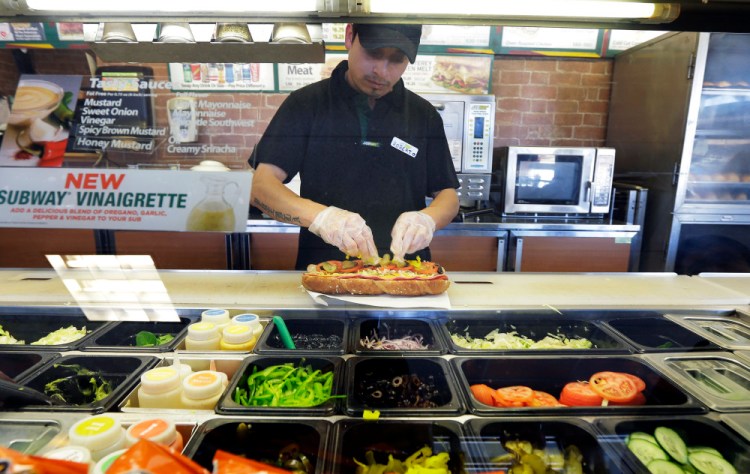Subway, the world-dominating “Eat Fresh” mega-deli struggling with sinking sales, said Thursday it plans to drop all artificial colors, flavors and preservatives from its American menus by 2017.
The most ubiquitous food chain on the planet, which serves nearly 2,800 sandwiches every minute, is only the latest food giant to sacrifice some man-made additives in hopes of winning back American eaters, who profess tastes for fresher, healthier cuisine.
The move will make anti-chemical crusaders, like the “Food Babe,” overjoyed. But it probably won’t make you, or their business, any healthier.
The chain is cutting artificial flavors and caramel coloring from its new roast beef recipe that involves roasting beef “with increased levels of garlic and pepper.” Vinegar will replace propionic acid, a preservative in its turkey. Banana peppers will be given their fluorescent sheen with turmeric, often used in Indian curries, instead of Yellow No. 5.
The changes were daunting, executives said, because the chain wanted to tackle its many different ingredients across its 27,000 U.S. shops without driving up prices. “But,” Subway director of corporate social responsibility Elizabeth Stewart said, “we felt it was important to set an ambitious goal as a means to give us something to shoot for and demonstrate our unwavering commitment to wellness.”
Subway now follows McDonald’s, Taco Bell and Pizza Hut, which have said within the last year they would hunt down man-made additives in some of their most popular grub. Packaged-food titans like Kraft and Nestle have said they’d also drop artificial stuff — even from foods historically revered as artificial, like neon-yellow Mac & Cheese.
“If the ingredients in your food are unpronounceable, we believe they shouldn’t be in your food,” Panera Bread said last month. (Sorry, cyanocobalamin, better known as vitamin B12!)
Knocking out artificial ingredients, experts said, has become a tried-and-true method for massive food chains wanting to look healthier without becoming, well, healthier. It’s a glitzy move of marketing, not nutrition: If chains really wanted to better their food, Penn State University food science professor John Coupland said, they’d change not their color, but their sugar content or portion sizes.
But here’s where it gets tricky. Axing the food elements that are least healthy carries a big risk: turning the product into something fewer people want. Cutting minor chemicals, though, gives the chain a healthful glow without actually changing anything important.
“They’re not getting in the way of their core business of selling delicious sandwiches, which people like with tons of cheese and mayonnaise and all this other stuff,” Coupland said. “But they get a lot of press from removing these tiny molecules.”
In Subway’s case, will the halo even make a difference? Subway has long advocated its healthful image, but consumer surveys by industry researcher Technomic show American diners think the chain — with its mass-produced meats, microwaves and mayonnaise-blasting guns — has lost its natural touch in the age of local foods, Chipotle and other fast-casual upstarts.
Subway’s chief marketing officer, Tony Pace, told the Associated Press that simpler ingredients were becoming a “necessary condition” to keep eaters happy, saying, “As their expectations go up, we have to meet those expectations.” But even he was doubtful that the change was enough to save their stale sales, which dropped 3 percent last year, falling faster than all of America’s top 25 food chains.
It’s not the first time Subway has bowed to pressure from those wanting to slash additives that, while hard to pronounce, are approved by federal food experts and found in hundreds of other meals.
After “Food Babe” blogger Vani Hari petitioned Subway to drop what she called a “yoga mat” chemical, azodicarbonamide, from its bread, the chain relented, even though the additive is a recognized harmless way to add fluffiness, lengthen shelf life and improve texture.
The chemicals Subway is dropping now are similarly hazard-free. Propionic acid is a common anti-spoilage additive that stops molds from growing and is, in the Food and Drug Administration’s words, “generally recognized as safe.” Subway is replacing it with vinegar, which is, chemically, nearly identical.
“These minor ingredients become a powerful way of signaling to consumers … who have the view that natural is somehow magical and better,” said Coupland, the Penn State professor. “The only real downside is if people think, ‘Hey, it’s a natural sandwich, I’m going to have a foot-long instead of a 6-inch sandwich,’ and think they’re getting something different.”
Send questions/comments to the editors.



Success. Please wait for the page to reload. If the page does not reload within 5 seconds, please refresh the page.
Enter your email and password to access comments.
Hi, to comment on stories you must . This profile is in addition to your subscription and website login.
Already have a commenting profile? .
Invalid username/password.
Please check your email to confirm and complete your registration.
Only subscribers are eligible to post comments. Please subscribe or login first for digital access. Here’s why.
Use the form below to reset your password. When you've submitted your account email, we will send an email with a reset code.